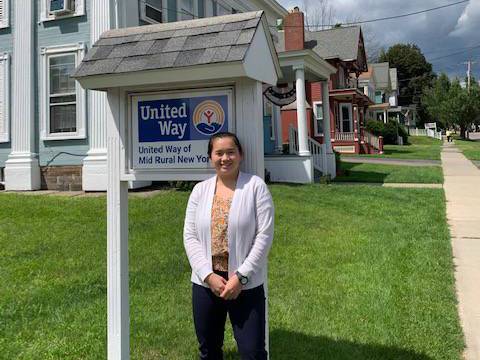Katie Keyes ’25 is one of 31 student fellows who completed research with a community-based organization in upstate New York this summer as a part of the Upstate Institute Summer Field School. She describes the project below in her own words:
Often, homelessness is viewed solely as an urban issue, eliciting images of people sleeping on park benches or living in encampments. However, rural homelessness is also a growing concern.
Rural homelessness faces unique challenges, such as fewer resources, shelters, affordable housing, funding, and services for a larger geographic area. Consequently, people experiencing rural homelessness are more likely to live in abandoned buildings, on state land, with family or friends, or in substandard housing. Addressing rural homelessness requires a tailored approach that looks at the root of this issue.
Through the Upstate Institute Summer Field School, I had the opportunity to work with the United Way of Mid Rural New York, which recently merged the United Ways of Chenango, Delaware and Otsego, and Madison. The United Way of Mid Rural NY is a nonprofit that raises money and reallocates it to other local nonprofits that address community health, education, or financial instability, primarily serving the ALICE population (asset-limited, income-constrained, employed). These individuals live above the federal poverty line (FPL) but struggle to afford basic living costs. The organization runs several community impact programs alongside its campaign, including the Dental Taskforce, Micro-loan, Dolly Parton Imagination Library, and a small food cupboard. Through collaboration with other organizations, the United Way maximizes resources to enhance the quality of life for local residents.
Since the merger, we wanted to learn more about how each county is experiencing homelessness. The United Way recommended different nonprofits, faith-based organizations, and local county officials, and I reached out for interviews. During these interviews, I asked about the services that were available, whether there were any noticeable trends in the area, whether certain groups are more at risk for homelessness, factors or barriers contributing to the issue, and future projects that would help community partners.
With the United Way, I also attended webinars, community meetings, and regional coalitions that touched on the issues of homelessness or other surrounding topics. Through these interviews, discussions, and literature reviews, I am learning how multifaceted the issue of homelessness is, and there is no one solution.
At the end of this fellowship, I will compile a comprehensive report from all the information gathered. This report could potentially influence future projects, fostering community awareness and addressing aspects of homelessness.
As someone who grew up in Madison County, I wanted to apply to the Upstate Institute to be involved with a community-based research project that directly helps my community. This experience highlighted the importance of building relationships between people, especially in a rural community where these collaborations are critical. As a biology major interested in healthcare and public health, this was a fantastic opportunity to see how organizations, companies, and people in rural areas can unite to support their communities.
